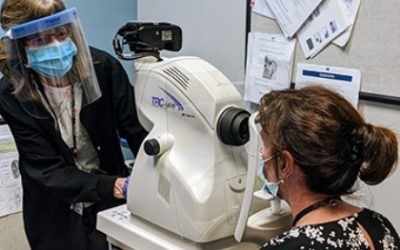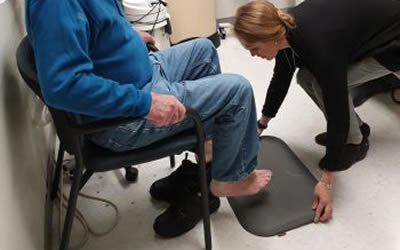Intensive glycemic control (INT) does not appear to have a protective effect when it comes to required eye procedures in patients with advanced diabetes.
Dulaglutide Might Reduce Erectile Dysfunction in T2D Patients
Even though diabetes is a major risk factor for erectile dysfunction, the effect of GLP-1 receptor agonists on erectile dysfunction remains unclear.
Antimuscarinic Agents Up Diabetes Risk in Female MHS Patients
Are drugs used to treat overactive bladders a risk factor for development of Type 2 diabetes mellitus (T2DM)?
SGLT2 Inhibitor Use Lower Among Women, Minorities
Sodium-glucose cotransporter 2 (SGLT2) inhibitors significantly reduce deaths from cardiovascular conditions, hospitalizations for heart failure and progression of kidney disease among patients with Type 2 diabetes
Sleep Disorders More Prevalent in Army Vs. Other Services
While sleep problems are widespread in active-duty U.S. military servicemembers, Army personnel appear to have the most problems.
Rising T2D Rates Increase VA’s Lower Extremity Amputations
Incidence rates of lower extremity amputation increased at the VA between 2008 and 2018, and burgeoning rates of diabetes played a role in the trend.
Uncontrolled Diabetes Limits Bariatric Surgery Benefits
About a third, 34%, of veterans 28% of military healthcare beneficiaries are considered obese.
Metformin Appears Underused for T2D in Veterans
About 80 million prescriptions are written in the United States each year for metformin.
Apps, Wearable Devices Increasingly Help Veterans Improve Diabetes Management
Like Americans everywhere, veterans have integrated smartphones and wearable devices into many aspects of their lives.
Pandemic Highlights Benefits of Continuous Glucose Monitors
For veterans with diabetes, managing their numbers has never been more important. While diabetes does not increase the risk of contracting COVID-19,
Technology Helps Veterans Better Manage Diabetes During Pandemic Restrictions
Across the country, diabetes patients have faced extraordinary challenges throughout the pandemic.
More Benefits for Metformin Are Emerging Beyond Blood Glucose Control
Metformin is like a fine red wine: Its appeal continues to grow over time. More than 70 years after its first clinical use in diabetes, the staple of blood glucose control continues to surprise researchers with unexpected benefits in treating COVID-19, cancer and dementia.
VA Expands Tools to Help Veterans and Clinicians Manage Hypoglycemia Risk
For years, diabetes management was primarily concerned with keeping blood sugar from going too high. Now, and especially at the VA, keeping blood glucose from going too low is just as important.
VA Makes It Easier for Veterans to Get Continuous Glucose Monitors
The VA’s new prescribing guidance for continuous glucose monitors significantly expands the number of veterans with diabetes who are eligible for the devices.
‘Happy Hypoxia’ Might Not Be Such a Mystery After All in COVID-19
Earlier in the COVID-19 pandemic, physicians were often baffled by patients who presented with extremely low levels of oxygen. Although oxygenation was so low it was potentially life-threatening in some cases, patients showed no obvious difficulty in breathing.
Data Predicts Life Expectancy of Older Veterans With Diabetes
BOSTON—Can the five- and 10-year life expectancy of older diabetes patients be predicted by history of co-morbid health conditions and medication? A new study suggested it can. The VA Boston Healthcare System-led study suggested that the ability to make such...
AI/AN Patients Faced Diabetes Care Disparities Within MHS
BETHESDA, MD—Readmissions following hospitalization for diabetes often occur and are more common in minority patients, who experience greater rates of complications and lower quality healthcare compared to white patients. A study in Military Medicine examined...
COVID-19 Pandemic Might Lead the Way for More Inpatient CGM Use
Devices Allow Remote Monitoring of Blood Glucose Levels ATLANTA—A silver lining in the dark cloud of the COVID-19 pandemic might be that healthcare systems have been forced to reconsider many processes, especially those involving close contact with patients. According...
Weight Gain May Endanger Some Benefits of Hepatitis C Cure
NEW HAVEN, CT—A year ago the VA announced it had eliminated chronic infections with hepatitis C virus in all veterans willing and able to be treated. More than 100,000 veterans achieved sustained virological response or a cure with the help of direct-acting antivirals...
Insulin Errors Potentially Plague Hospitals Treating Diabetes Patients
Guidelines from the Institute of Safe Medication Practices have pointed out that insulin is associated with more medication errors than any other type or class of drugs. With more than 11,400 insulin-using veterans hospitalized in a recent two-year period at the VA, that is an especially critical issue for the healthcare system. Intense focus on avoiding problems with insulin, as well as new products, have improved the situation, both with subcutaneous administration – such as insulin pens – and with intravenous insulin in the critical care setting.
New Focus in the Fight to Reduce CV Risks in Type 2 Diabetes
At one point, intensive glycemic control was seen as a magic bullet to keep Type 2 diabetes patients from developing cardiovascular disease. That approach faded, however, when VA research cautioned that any benefits of intensive therapy must be weighed against adverse effects such as hypoglycemia and weight gain. Now the focus has shifted to better medication selection, with guidelines suggesting that, for Type 2 diabetes patients who have cardiovascular disease or are at high risk for it, therapy including an SGLT-2 inhibitor or GLP-1 RA should be considered as optimal treatment.
Servicemembers With Uncontrolled Diabetes Allowed to Remain In Military
While, in general, the U.S. military will not accept recruits diagnosed with diabetes, that is especially the case with patients who use insulin, which is seen as an automatic disqualification. The situation is different, however, in military personnel already serving. While most of those retained after diagnosis have well-controlled blood sugar, about a third have hemoglobin A1c measures greater than 7%. That’s why the ability to closely monitor those servicemembers with tools such as continuous glucose monitoring is increasingly important.
Too High Rate of Diabetes Therapy Intensification at VA Hospital Discharge
BOSTON — About 10% of older veterans discharged from VAMCS had their diabetes medication intensified, even though half of them were unlikely to benefit because either they already had reached their blood glucose goals or had limited life expectancy.
Veteran Study Links DPP-4 Inhibitors to Greater Joint Pain Risk
MORGANTOWN, WV—Dipeptidyl peptidase (DPP)-4 inhibitors appear to be associated with joint pain in older veterans who receive care at the VHA but also are Medicare beneficiaries, according to a new study. The report in American Health Drug Benefits pointed out that...
With Obesity, Moderate Hyperglycemia Hastens Cognitive Decline
PITTSBURGH —What precisely is the relationship between cognitive decline in patients with both diabetes and obesity? Researchers from the VA Pittsburgh Healthcare System and the University of Pittsburgh sought to investigate the potential mechanisms leading to those...
VA Steps Up Foot Mat Program to Prevent Diabetic Foot Amputations
WASHINGTON—For diabetic veterans, a new device available through the VA may prevent foot ulcers—and possibly amputations. The VA treated more than 75,000 diabetic foot ulcers last year at a median cost of $47,000. That’s more than $3.5 billion just for foot care....
Common Blood Test Identifies Veterans at High Risk of Diabetes
ATLANTA—A test included in nearly all routine blood chemistry panels provides a surprising window on a patient’s future health. The random plasma glucose test—at levels previously considered unremarkable—can predict whether a patient is likely to develop diabetes in...
PTSD Increases Risk of Early Stroke, TIA in Young Veterans
More Significant Risk Factor than Diabetes, Sleep Apnea CHAPEL HILL, NC—Developing posttraumatic stress disorder as a young adult doubles a veteran’s risk of a transient ischemic attack before middle age, according to a new study. The research, published in the Stroke...
Intensifying Diabetes Treatment Increases Short-Term Mortality for Veterans
NASHVILLE, TN—Adding insulin or sulphonylurea to metformin increased the risk of death among veterans with diabetes in the initial six- and 12-month period, according to a recent study. Insulin increased the risk of death 66% more than sulfonylurea at six months, but...
Metformin Linked to Reduced Cardiovascular Events in Certain Veterans
Compared to Sulfonylureas in Patients with Impaired Kidney Function NASHVILLE, TN—It wasn’t that many years ago that prescribing metformin for Type 2 diabetes patients with impaired kidney function was discouraged for safety reasons. Now, in an about-face, a new VA...





